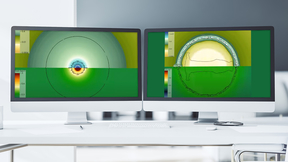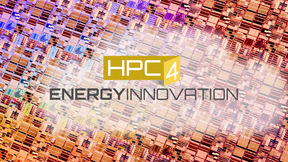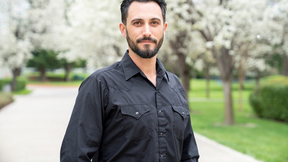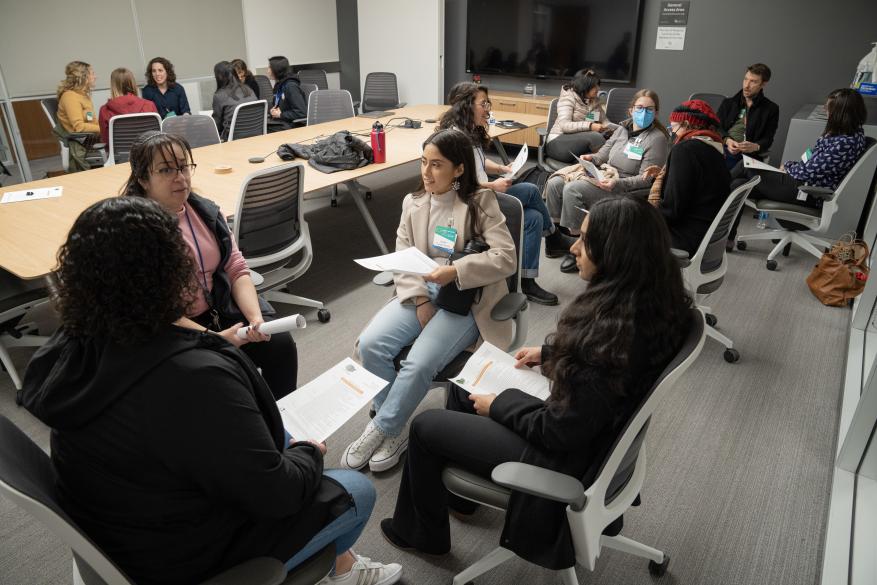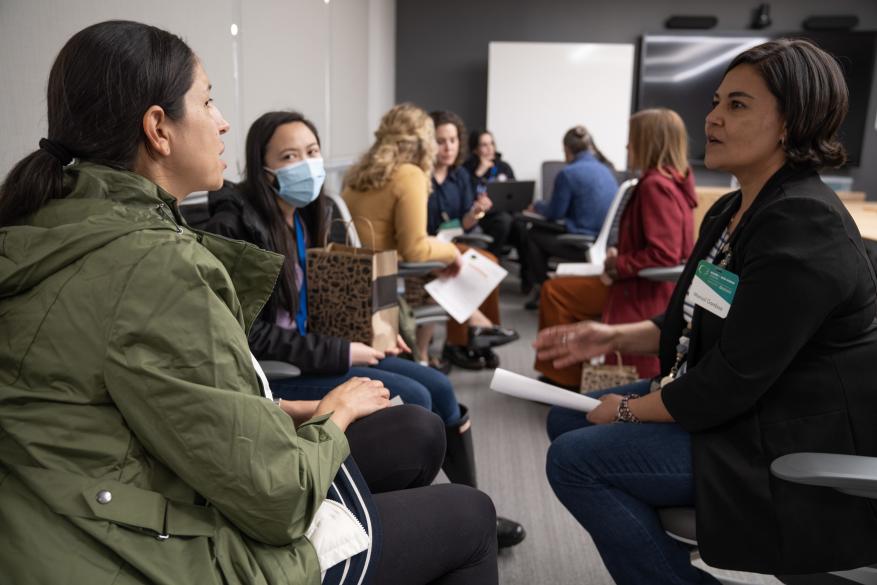First-ever hybrid Women in Data Science Livermore event celebrates achievements, supports women in the field
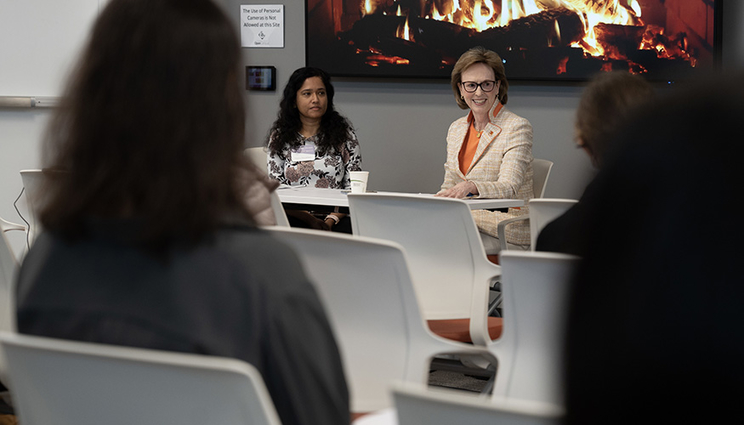 (Download Image)
(Download Image)
Former Lawrence Livermore National Laboratory Associate Director for Computation/Livermore Lab Foundation President Dona Crawford (right) sat down with LLNL biostatistician Nisha Mulakken for a fireside chat as part of the 2023 Women in Data Science (WiDS) Livermore event on March 8. Photo by Blaise Douros.
Celebrating International Women’s Day on March 8, Lawrence Livermore National Laboratory (LLNL) women data scientists, Lab employees and other attendees interested in the field gathered at the Livermore Valley Open Campus for the annual Livermore Women in Data Science (WiDS) regional event held in conjunction with the global WiDS conference.
Attendees met online and in-person for the forum, highlighting women in computing and the data sciences, to network, listen to technical talks by Lab scientists and others, engage in a fireside chat with former LLNL Computation Associate Director Dona Crawford and watch as LLNL Bioinformatics Group Leader Marisa Torres spoke about her work applying machine-learning tools to drug discovery live from the WiDS worldwide conference at Stanford University.
Held for the 6th year, but for the first time ever in a hybrid format, Livermore WiDS provided a space for women to share their career paths and experiences, hear advice on navigating a male-dominated field, learn keys to achieving work-life balance, discuss the importance of mentorship and demonstrate to women in the data science field that they’re not alone.
WiDS co-organizer and Lab data scientist Mary Silva welcomed attendees to the event, which kicked off with a virtual talk by Duke University Assistant Professor of Biomedical Sciences Amanda Randles. Randles described her work using computer modeling to create digital twins of human vasculature that could replace invasive procedures, identify patients for heart surgery and predict medical outcomes. A former Lawrence Fellow at LLNL, Randles led a 2015 Gordon Bell Prize-winning paper with LLNL co-authors that modeled the Earth’s mantle convection. In another paper that was a finalist for the award, she, along with LLNL’s Erik Draeger, William Krauss and Tomas Oppelstrup, demonstrated the first full heartbeat at cellular resolution using HARVEY, a computational physics model that simulates blood flow throughout the body. Randles now heads her own Randles Lab at Duke and is part of the Aurora Early Science Program at Argonne National Laboratory to use exascale computing to model how cancer cells move in through blood vessels.
During her talk, Randles discussed her circuitous career arc, the challenges of balancing work with raising children, the importance of advocating for yourself and saying “no,” and the critical role mentors have played for her along the way.
“We’ve come a long way,” Randles said. “We’re seeing a lot of women getting opportunities, but at the same time, I was the only woman at many of these [computing] events. We’re making progress, but there’s still a way to go and we’re still addressing this [imbalance].”
LLNL data scientist and WiDS co-organizer Mary Silva (foreground, left) meets with (clockwise) University of California, Merced Ph.D. student Jocelyn Ornelas Munoz, LLNL data scientist Harlene Kaur and U.C. Merced Ph.D. student Jacqueline Alvarez during a WiDS Livermore speed mentoring session on March 8. Photo by Blaise Douros.
Following Randles, Crawford, LLNL’s former Computation associate director (from 2001-2016) and president and co-founder of the Livermore Lab Foundation, sat down with LLNL biostatistician Nisha Mulakken for a fireside chat. Crawford spoke about her journey from a young student interested in math to leading LLNL’s computing program and the hurdles she faced along her path.
Crawford remarked on the changes she has seen in computing since beginning her career at Sandia/California in 1976. She shared tips for women in leadership roles, her advice on juggling family and work and her four “mantras” for a healthy work-life balance: You can do everything you want, just not everything at once; It’s a marathon, not a sprint; Compartmentalize tasks; and show up and be present. Crawford encouraged attendees to work on building self-confidence in their early career, admitting that even after all her accomplishments, she still experiences “imposter syndrome” from time to time.
“It’s OK if you feel this way, it’s completely normal,” Crawford said. “You are enough as you are. You have something unique to contribute and you can make the world a better place.”
Mulakken, who develops new molecular compounds and designs tools for rapid pathogen detection, has served as a mentor through LLNL’s Data Science Summer Institute, which she co-directs. Mulakken gave her own advice for early-career professionals and reiterated the importance of mentorship, which she called “our greatest endeavor.”
“Mentorship is very important to me,” Mulakken said. “Mentorship gives you a way to do something good in the world and enables others to do their best.”
The fireside chat was a highlight for attendee Mari Thurgate, a science reference librarian at LLNL, who said she has worked for the Lab since 2020 but has only been on-site for a few months due to the COVID-19 pandemic.
“One of the things I need to do is outreach and help people at the Lab do their jobs better,” Thurgate said. “We know there is a lot going on in data science here, but we don’t know the people [working on it]. I want to meet people and learn what’s being done in data science.”
Following the fireside chat, attendees tuned into the livestreamed WiDS Worldwide conference from Stanford, where LLNL’s Torres presented on the work she and her group are doing to develop machine learning-based platforms to predict protein-molecule binding for designing new therapeutic drugs and countermeasures to diseases, including cancer — through the Accelerating Therapeutic Opportunities in Medicine (ATOM) consortium — and for COVID-19.
“We’re using supercomputing to understand how drugs and diseases affect humans,” Torres explained. “We never have enough data, so we’re using machine learning and simulation to help fill the gaps.”
After breaking for lunch, attendees and Lab scientists engaged in an hour-plus session of speed mentoring, a “round-robin” where they met face-to-face and online in breakout groups to discuss mentorship opportunities at the Lab.
Among the several dozen in-person attendees was Cassandra Smith, a Contra Costa County sheriff’s deputy, who is completing a masters’ degree in cybersecurity and was interested in finding out about LLNL and its mentoring programs.
“I’m here to learn more about everything the Lab does,” Smith said. “It’s a really great opportunity and people should take advantage of it while they can.”
First-time WiDS attendee Uttara Tipnis, a postdoctoral researcher in computer vision who joined the LLNL staff in 2021 following an internship, said she has found it difficult to meet people since returning to work on-site. Tipnis said she was looking forward to the mentoring and networking sessions to search for a future summer student and find a mentee to work with.
“It’s important to have these events and to network,” Tipnis said. “It’s good to have a space geared specifically for women. As a woman, it can be hard to find mentors — I’ve had great mentors — and I would like to be a mentor myself. I would encourage anyone to keep an eye out for these events and attend them in the future.”
The mentoring session also was the highlight for Jacqueline Alvarez, who was attending WiDS for the second time. A University of California, Merced Ph.D. student in applied mathematics, Alvarez participated in the 2021 LLNL/UC Merced Data Science Challenge and became a summer intern at the Lab. She will be returning this summer, and, as a prospective future Lab employee, Alvarez said she enjoyed and listening to women speak about their journeys.
“We all share this common experience of being one of the only females in the room; it’s reassuring that if they can do it, I could do it and I shouldn't be doubting myself. I could keep going and probably be in the same positions as they are in the future,” Alvarez said. “Coming back here, it's nice to be in this space, to learn things about the Lab and meet new people and listen to the research. Every time I talked to someone here, I learned about a new project going on or a new department in the Lab. It’s just really exciting.”
LLNL Computing Workforce Manager Marisol Gamboa (right) counsels WiDS Livermore attendees during a speed mentoring session at the Livermore Valley Open Campus on March 8. Photo by Blaise Douros.
Concluding the event was a talk by LLNL design physicist Kelli Humbird, who presented on her work applying cognitive simulation (CogSim)— the combination of AI and supercomputing — to inertial confinement fusion (ICF) experiments performed at the National Ignition Facility. Humbird discussed how CogSim tools and simulations had predicted fusion ignition before it happened in December 2022 with a slightly greater than 50% probability of reaching “breakeven:” generating more energy from the fusion reaction than the laser power it took to produce the reaction.
"While the rest of the world was super excited about ignition, I was super excited about our predictive capability, especially with uncertainties,” Humbird said. “This is something that our team has been working toward for many, many years.”
Humbird, who changed her career trajectory many times in her life, said she rediscovered her love for physics and scientific research during a summer internship at LLNL that “changed everything.” She encouraged attendees not to “settle” for work they’re not passionate about and to find a trustworthy mentor.
“Careers are really long, and it’s easier to go to work every day when you enjoy where you work and who you’re working with,” Humbird counseled. “I’m one of a few women (in my field), which comes with its own challenges. Good mentors are everything, especially when you’re navigating situations that are challenging for one reason or another. I’ve really relied on people that have been around a lot longer than I have to make decisions and still use mentors to get where I want to be.”
The event concluded with a reception and more networking. Alvarez’s classmate in applied math at UC Merced, Ph.D. student Jocelyn Ornelas Munoz, like Alvarez, will be interning at LLNL in the summer. Munoz said she attended WiDS to engage with women Lab scientists and learn more about applying machine learning to medical imaging.
“I think it's very empowering to be surrounded by women in science and to hear their stories and their journey, and how they've dealt with being a woman,” Munoz said. “I've had those experiences in my life. I study applied math, and you sometimes find yourself the only woman in a space. So how do you navigate through that? And how do you reaffirm to yourself that you belong in that space? If others don't create space for you, how do you create it for yourself?”
Harlene Kaur, a data scientist in the Applications, Simulations, and Quality (ASQ) division of LLNL's Computing Directorate, said she wanted to attend her first WiDS to learn how to navigate her career at the Lab and about other data science projects she might be interested in working on in the future. At WiDS, Kaur said she discovered a place to find mentorship, gain new perspectives and answers to issues that women often face in the workplace.
“I learned that my negative experiences aren't unique, and other people experience the same things as I do — whether it’s being afraid to speak up in meetings or pursuing something that I might not feel like I have the qualifications for and being more ambitious. I liked hearing everybody's different perspectives on navigating through these issues that we face as women. I feel like I have a community, and it feels nice.”
More than 125 people, including some men, registered for the hybrid event. WiDS Livermore co-organizer Jen Bellig said she was happy the Lab could once again hold an in-person WiDS event after a two-year virtual-only hiatus.
“It’s great to see people connecting and talking, and seeing people I haven’t seen or only have seen working remotely," she said. “To see students connecting face-to-face with Lab employees just feels more meaningful.”
Other WiDS co-organizers included Holly Auten, Nikki Finnestead, Emilia Grzesiak, Christine Himes, Anna Jurgensen and Sira Neily. The event was co-sponsored by LLNL’s Data Science Institute and the Office of Strategic Diversity and Inclusion Programs. The recorded talks from the event will be posted on the Livermore Lab Events YouTube page at a later date.
For more on WiDS, visit the web and WIDS conference site.
Contact
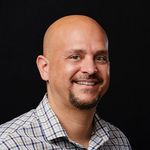 Jeremy Thomas
Jeremy Thomas
[email protected]
(925) 422-5539
Related Links
WIDS ConferenceWomen in Data Science
Tags
ASCHPC, Simulation, and Data Science
Computing
Science
Careers
Community Outreach
Featured Articles
